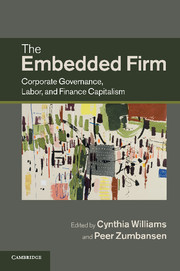Book contents
- Frontmatter
- Contents
- Figures
- Tables
- Contributors
- 1 Introduction: corporate governance after the ‘end of history’
- Part I Historical trajectories of business and regulation
- Part II New interests, new shareholder constellations, new landscapes
- Part III Labor’s evolution in the new economy
- Part IV The transnational embedded firm and the financial crisis
- 17 The intellectual foundations of the global financial crisis
- 18 Why executive pay matters to innovation and inequality
- 19 Products, perimeters and politics
- 20 Modernizing pension fund legal standards for the twenty-first century
- Part V Conclusion
- Index
- References
17 - The intellectual foundations of the global financial crisis
analysis and proposals for reform
from Part IV - The transnational embedded firm and the financial crisis
Published online by Cambridge University Press: 07 September 2011
- Frontmatter
- Contents
- Figures
- Tables
- Contributors
- 1 Introduction: corporate governance after the ‘end of history’
- Part I Historical trajectories of business and regulation
- Part II New interests, new shareholder constellations, new landscapes
- Part III Labor’s evolution in the new economy
- Part IV The transnational embedded firm and the financial crisis
- 17 The intellectual foundations of the global financial crisis
- 18 Why executive pay matters to innovation and inequality
- 19 Products, perimeters and politics
- 20 Modernizing pension fund legal standards for the twenty-first century
- Part V Conclusion
- Index
- References
Summary
Introduction
The past two years’ financial, and then economic, crises have led to widespread calls for rethinking market practices and regulation. A complex of specific market practices that have developed in the transition from an ‘originate-and-hold’ to an ‘originate-and-distribute’ model of banking have been the focus of industry reports, domestic regulatory proposals and multilateral initiatives. Many bank practices have been understood to have contributed to the crisis, and so are targeted for reform. These include, among others, excessive leverage; off-balance sheet accounting for special-purpose vehicles; securitization practices that left banks with few incentives to exercise careful credit screening; the complexity of financial products and lack of regulatory oversight or central clearing facilities for derivatives, especially credit default swaps; pro-cyclical risk models adopted in Basel II; and conflicts of interest at credit ratings agencies. As this chapter is being written, the situation is in flux and what regulatory solutions will emerge is far from clear.
It is not surprising that the interrelated failings in the global financial markets are difficult to untangle and therefore to address, particularly since the economic crisis is not yet past and the regulatory challenges continue to evolve. Nor it is surprising that with the systematic deregulation of the financial markets, amongst other industries, over the past three decades in the United States and to a somewhat lesser extent the United Kingdom, the dramatic empirical demonstration of the results of that trend have convinced many that deregulation went too far, and that it is now time to restore an effective regulatory balance.
- Type
- Chapter
- Information
- The Embedded FirmCorporate Governance, Labor, and Finance Capitalism, pp. 383 - 412Publisher: Cambridge University PressPrint publication year: 2011
References
- 2
- Cited by



